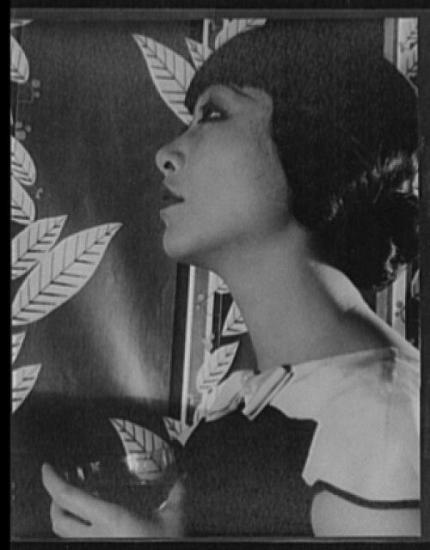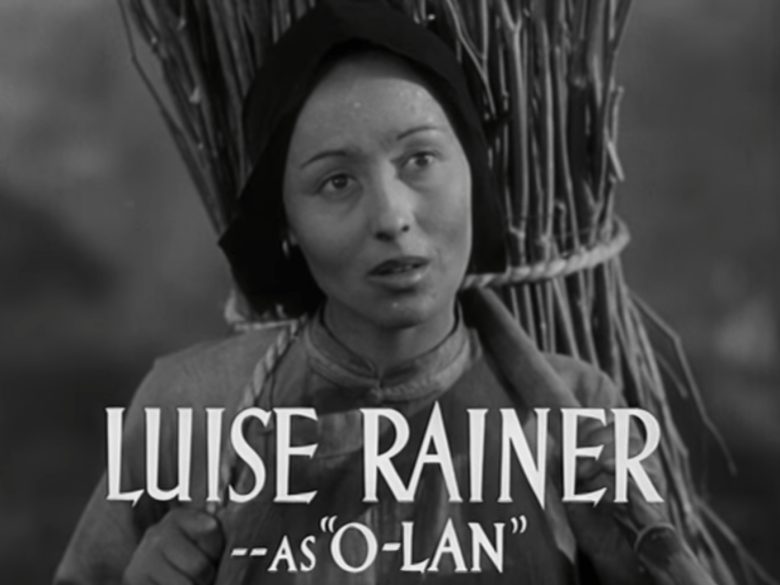
By GUY AOKI, Rafu Shimpo Contributor
When Asian Americans marvel at stories about the careers of their favorite White TV and movie actors, they often forget about the careers of minority actors cut short because of their race.
MGM wouldn’t even consider allowing Anna May Wong to star as O-Lan in “The Good Earth,” the 1937 film about poor farmers in China, which cast Asians primarily as background characters and White actors as the principals wearing yellowface make-up (Luise Rainer won the Oscar for Best Actress).

Like Josephine Baker, who found better opportunities in France, Wong–after being upset by the stereotyped roles she was getting–fled to Europe and lived and worked there for about five years. Decades later, Bruce Lee, even after co-starring in TV’s “The Green Hornet” as Kato, had to move to Hong Kong to find meaningful work. To add insult to injury, Warner Brothers took his concept and turned it into the popular “Kung Fu” series starring non-Asian David Carradine.
Katherine Hepburn, Shirley MacLaine, Fred Astaire, Marlon Brando, and John Wayne all wore prosthetic make-up to play Asians.
Asian women’s love interests were invariably White (or if the director felt progressive, Black). Asian men weren’t allowed to get close to anyone–not even Asian women. Asian males were either written as villains threatening to take over the world (e.g., Fu Manchu, Ming the Merciless) or asexual wimps only there to be laughed at and put down.

This led to self-loathing and many Asian women became so embarrassed by their own men that they totally rejected them as romantic possibilities (What other ethnic group ever said about all men of their shared race, “Dating them would be like dating my father or brother?”).
There were a few bright spots where James Shigeta was the romantic lead and “got the girl” in films like “Crimson Kimono” (’59), “Walk Like A Dragon” (’60), and “Bridge To The Sun” (’61).
In the mid-1990s, there was some hope that things were changing when “Joy Luck Club” became a commercial and critical success, especially among women of all backgrounds. “Dragon: The Bruce Lee Story” was the #1 movie in the country for two weeks. Russell Wong starred in the syndicated TV series “Vanishing Son,” romancing a new woman in every episode. And Margaret Cho starred in the first Asian American family television sitcom, “All American Girl.”

But we never quite gained traction on an ongoing basis.
In 1999, none of the 26 new series debuting across the top four networks (ABC, NBC, CBS, Fox), starred a person of color. Outraged, the NAACP threatened boycotts. Latinos sponsored a “brown out” day encouraging their community to not watch any television.
Asian Americans also banned together, forming the Asian Pacific American Media Coalition (APAMC). Along with Native Americans, we began meeting with the Presidents of each network and their heads of casting, drama, comedy, and reality development.
The networks provided the APAMC with annual data on the number of Asian Pacific Islanders (APIs) hired for regular, recurring, and guest roles and as reality show contestants. When I slammed CBS for constantly casting APIs as suspects or villains in their rebooted “Hawaii Five-O” series, their casting and diversity department flew to the University of Hawaii at Manoa to hold sessions to meet and become aware of more local actors.
When season after season, the most API regulars CBS could muster was two, I suggested a meeting with all of their writers and producers so I could brainstorm with them how to incorporate APIs into their existing shows and develop new ones where we would be the stars.
It was so successful, GLAAD and ethnic advocacy groups were later invited to join. After one session ended, a White writer exclaimed to another with his jaw wide open, repeating verbatim something I’d said: “One out of every six doctors in this country is of Asian descent?!”
Yes. So cast them in your shows! We’re not asking for handouts! Just reflect reality!
Pointing how, historically, Asian men had not been seen as romantic considerations, I praised the producers of “Five-O,” “The Mentalist” and other series for pairing Asian American male cast members with White women, asserting our mainstream appeal is not limited to just Asian females.
This led someone to think of casting Kal Penn as the love interest of Cobie Smulders for nine episodes of “How I Met Your Mother.” CBS liked him so much, a year and a half later, they made Penn a regular on “We Are Men.” The next season, the network put him in “Battle Creek.”
The following year, ABC included Penn in “Designated Survivor,” which lasted three seasons. Then NBC picked him to star in “Sunnyside.”

Across the networks, the number of API cast members, writers, and directors had begun to grow. But by 2011, there had been only one new series where an API was the star (first name in the credits): ABC’s “Cashmere Mafia’ starring Lucy Liu.
So as co-chair of the APAMC, I gave the networks an ultimatum: They had three years (by Fall 2014) to air a series with an API star. “Because if you’re not comfortable with seeing billboards with an Asian face promoting your new show, you need to deal with that now, or we‘ll still have the same problem five, ten years from now.”
In 2012, Fox premiered “The Mindy Project” starring Mindy Kaling. Two years after that, CBS debuted “Stalker” with Maggie Q and ABC offered “Selfie” starring John Cho with “Fresh Off The Boat”–the first Asian American family show in over 20 years–waiting in the wings as a mid-season replacement.
API regulars on CBS eventually jumped to 21. And for the 2017-2018 season, ABC had more API regulars—24–than any network in the history of television.
After 2018’s “Crazy Rich Asians” broke box office records, becoming the highest-grossing romantic comedy of the past 10 years, the networks jumped on the bandwagon, ordering pilots that starred Asians and entire Asian families. But none of them were picked up as series and momentum came to a halt.
When APIs experienced an unprecedented level of hate crimes from those who blamed them for the COVID virus, the leadership of the APAMC was asleep at the wheel and did not push for meetings with the networks when it was crucial to remind them of their responsibility to write stories that demonstrated our “Americanness.”
In 2021, after an on-again/off-again 19-year campaign to meet with Jay Leno to get him to stop making jokes about Koreans eating dogs and Chinese serving cats in restaurants, the former “Tonight Show” host finally agreed to make a public apology. Mainly because my organization, Media Action Network For Asian Americans (MANAA) had threatened to go after the advertisers of his upcoming game show “You Bet Your Life” if he didn’t.
On a Zoom call with MANAA brass and the producers of his show, I told him, “Nobody distinguishes between who’s North Korean or South Korean or Japanese or Chinese in this country. You think anyone’s going to go up to a person in a grocery store and ask them, ‘Excuse me, sir, are you Chinese? Or, you’re not? OK, never mind.’ No! If they look Chinese, that’s a good enough reason to attack them! Because in this country, people have never accepted us as Americans in the first place!”
An hour after the meeting, Leno called me back and said, “You know, when you talked about the hate crimes, that’s when I got it. That really got through to me.”
Streaming services like Netflix, Hulu, and Amazon Prime have done a good job of giving APIs not only the chance to star in their own projects but often to write, produce and direct them as well.
The film “Everything Everywhere All At Once,” one such example, was recently nominated for the most Oscars (11) including Best Picture, Director, Lead Actress, and Supporting Male Actor.
And the first show NBC renewed this season was “Quantum Leap,” which now stars Korean American Raymond Lee as Dr. Ben Song.
While whitewashed movies (non-Asians playing parts originally written for APIs) is still a concern, there has been a growing backlash against them (“Last Airbender,” “Aloha,” “Dr. Strange,” “Ghost in the Shell”) with apologies often coming from the filmmakers themselves.
But in my experience, it’s constant vigilance and prodding that keeps Hollywood on the right path. They’re still not on automatic pilot when it comes to understanding the importance of allowing APIs to have the same opportunities as their White counterparts.

The good news? Despite White gatekeepers who kept Asian-centered projects from being greenlit–assuming without any evidence that White audiences wouldn’t care about them nor pay money to see them in movie theatres–Asians and Asian American have proven themselves to be huge money-makers and critical successes. And we all know how copycat Hollywood loves to duplicate what works.
In 1992, Guy Aoki co-founded the watchdog group Media Action Network For Asian Americans (MANAA), which was a founding member of the Asian Pacific American Media Coalition (APAMC) from 1999 to 2021. He co-wrote the Rafu Shimpo media column “Into the Next Stage” from 1992 to 2017 and was a Los Angeles Times reporter and writer of syndicated radio shows for Dick Clark. Opinions expressed are not necessarily those of The Rafu Shimpo.
This project was supported in whole or in part by funding provided by the State of California, administered by the California State Library